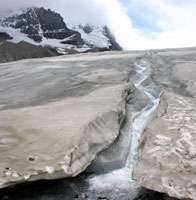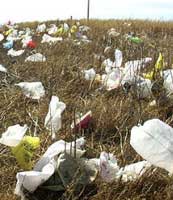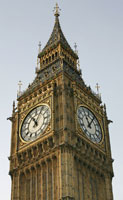
News |
- Sharing of Eco-Patents Grows
- Omni-Label Needed to Guide Consumer Behavior
- PowerUP Canada - Citizens Movement for Strong Climate Laws
- Sierra Club Ranks Canada's Federal Parties
- Bi Pole III Open Houses Across Province
- Canada Creates Three New Artic Wildlife Areas
- Glacier Melt Report Cause for Global Concern
- Fee for Disposable Bags in California?
- Gore's Challenge to America: 100% Renewable Energy
- London's New Plan to Fight Climate Change
- Atikaki Park & Bloodvein Heritage River Plan Released
- Manitoba Awarded A+ for Energy Efficiency
| Sharing of Eco-Patents Grows | 16 September 08 |
 Bosch, DuPont and Xerox Corporation have joined the Eco-Patent Commons, an effort that brings global companies together to share existing technologies, protect the environment and support sustainable development. Bosch, DuPont and Xerox Corporation have joined the Eco-Patent Commons, an effort that brings global companies together to share existing technologies, protect the environment and support sustainable development.IBM, Nokia, Pitney Bowes and Sony launched Eco-Patent Commons in January 2008 in partnership with the World Business Council for Sustainable Development (WBCSD). Patents are made available to the public on a website hosted by the WBCSD and membership is open to all individuals and companies. Free, easy to understand summaries of the patents are provided in an effort to help other companies solve their own environmental problems. Patents involve innovations directly related to the environment or innovations in manufacturing or business processes. The addition of Bosch, DuPont and Xerox has more than doubled the total number of eco-patents available. Xerox has contributed technology which reduces the time and cost of removing toxic waste from water and soil. One of DuPont's patents uses enzymes to convert non-recyclable plastics into fertilizer and Bosch's automotive technologies lower fuel consumption and reduce emissions. Visit World Business Council for Sustainable Development: Eco-Patent CommonsView September 8, 2008 CSR Wire article View September 11, 2008 Globe and Mail article View September 9, 2008 Sustainable Business article View September 8, 2008 Green Biz article Sources: CSR Wire, Globe and Mail, Sustainable Business, Green Biz, World Business Council for Sustainable Development |
|
 Print version Print version |
Top |
| Omni-Label Needed to Guide Consumer Behavior | 16 September 08 |
 An influential food policy advisor is calling on the UK government to adopt the 'Good Food System', a comprehensive labeling scheme to provide consumers ethical, ecological, and health information about their food. An influential food policy advisor is calling on the UK government to adopt the 'Good Food System', a comprehensive labeling scheme to provide consumers ethical, ecological, and health information about their food.Tim Lang, a professor and advisor to cabinet office suggests an easy to understand "food flower" on packaging. Each petal represents a different impact of food sustainability. Lang suggests criteria include water use, carbon footprint, biodiversity, and social implications. "While governments continue to let the market take its course, ill-informed consumer choices are contributing to massive crises in human health, food security and environmental degradation," said Lang. These "omni-standards" would educate consumers and guide behavior. People are often confused over contradictory information; for example, there are strong nutritional benefits to eating fish yet over-fishing has significant ecological impacts on our oceans. Lang encourages the UK government to set up an independent body of experts to compile information and address the benefits and impacts of our food. View September 9, 2008 Common Dreams articleView September 8, 2008 BBC article View September 9, 2008 Independent News article View September 9, 2008 Food and Drinks article View September 9, 2008 Business Green article Sources: Common Dreams, BBC News, Independent News, Food and Drink Exec, Business Green |
|
 Print version Print version |
Top |
| PowerUP Canada - Citizens Movement for Strong Climate Laws | 11 September 08 |
 Citizens and organizations across Canada including leaders in academia, science, business, civil society and environmental advocacy are uniting in a new citizen's movement calling for stronger action on climate change. The official launch September 10, 2008 of PowerUP Canada comes one day after many of the country's most influential leaders, including former prime ministers, released recommendations for stronger climate laws and policies in Canada. Citizens and organizations across Canada including leaders in academia, science, business, civil society and environmental advocacy are uniting in a new citizen's movement calling for stronger action on climate change. The official launch September 10, 2008 of PowerUP Canada comes one day after many of the country's most influential leaders, including former prime ministers, released recommendations for stronger climate laws and policies in Canada."Canadians are concerned and trying to do their part but we have some of the weakest laws in the industrialized world and that's why global warming pollution in Canada is projected to keep growing," said Tzeporah Berman, Executive Director of PowerUP Canada. "We're going to make sure Canadians have a place to voice their concerns and get the information they need to clarify the difference between real climate leadership and spin." PowerUP Canada will provide Canadians with a positive new vision for Canada, provide non-partisan information about global warming and a common campaign to amplify citizens' voices, clarify federal parties' and candidates' climate positions, host public events, and build an online networking community. PowerUP Canada also released a new national poll that clearly shows the majority of Canadians believe stronger climate laws will improve our economy. View September 10, 2008 Canadians for Climate Leadership (CCL) press releaseView September 9, 2008 Canadians for Climate Leadership (CCL) press release Visit PowerUP Canada website View September 9, 2008 CCL statement, Time to Get Serious on Climate Change (PDF) View September 9, 2008 CBC News article View September 9, 2008 Tyee Blog posting View Sierra Club Canada's Climate Crisis Election Countdown website Sources: CCL, CBC, Tyee |
|
 Print version Print version |
Top |
| Sierra Club Ranks Canada's Federal Parties | 09 September 08 |
 Sierra Club Canada has unveiled its report card evaluating the five federal parties' climate-change policies. The new publication, Voter's Guide to the Climate Crisis Election, was released September 5, 2008, the eve of what the group is calling the "climate crisis election". Sierra Club Canada has unveiled its report card evaluating the five federal parties' climate-change policies. The new publication, Voter's Guide to the Climate Crisis Election, was released September 5, 2008, the eve of what the group is calling the "climate crisis election"."There is no doubt that the climate crisis will be pivotal in the upcoming federal election," said Stephen Hazell, executive director of Sierra Club Canada. The Voter's Guide to the Climate Crisis Election is an informative explanation of the key issues in climate change science and policy. It is designed help voters understand issues and concludes with assessment of climate change platforms of the major federal political parties. To earn a passing grade a party must:
Jean Langlois, Sierra Club's national campaigns director, said the parties could have a chance to score better in a final report card to be released during the anticipated election by beefing up its climate commitments. Mr. Langlois added he expected the Parties to introduce more details of their policies during the election campaign that could allow them to score higher. The initial grades assigned to each party's climate change platform are:
The Sierra Club gave the five parties a draft of its evaluation of their policies mid-August to give them a chance to respond to criticism or correct mistakes, Mr. Langlois said. View Sierra Club of Canada September 5, 2008 press releaseView September 2008 Sierra Club of Canada Report, Voters Guide to the Climate Crisis Election (PDF) View September 5, 2008 Ottawa Citizen article Sources: Sierra Club Canada, Ottawa Citizen |
|
 Print version Print version |
Top |
| Bi Pole III Open Houses Across Province | 09 September 08 |
 Manitoba Hydro has announced its public open houses for information regarding the Bi Pole III direct current project to bring hydro electricity from northern Manitoba to urban areas, and to the utility's export clients. Today all direct current bi pole transmission in Manitoba travels through the same North-South corridor, between Lake Winnipeg and Lake Manitoba. Manitoba Hydro has announced its public open houses for information regarding the Bi Pole III direct current project to bring hydro electricity from northern Manitoba to urban areas, and to the utility's export clients. Today all direct current bi pole transmission in Manitoba travels through the same North-South corridor, between Lake Winnipeg and Lake Manitoba.The publicly owned utility aims to build a new direct current line in order to improve retention of power as it is transmitted, while also increasing security on the province's system. Concerns about weather events means that an additional corridor would decrease risk to the transmission system. The dates and locations are posted on Manitoba Hydro's web site and on the Manitoba Wildlands calendar. Controversy about route options for Bi Pole III has been evident in the Manitoba Legislature and some media outlets. Manitoba's NDP government announced in 2007 that the province's intact east side boreal region would not be transected by hydro lines and corridors, and directed Manitoba Hydro to proceed with a corridor on the west side of the province. View September 8, 2008 Winnipeg Free Press articleView 2007 Manitoba Hydro Routing Study Report View Manitoba Hydro Public Open Houses release Sources: Winnipeg Free Press, Manitoba Hydro |
|
 Print version Print version |
Top |
| Canada Creates Three New Artic Wildlife Areas | 09 September 08 |
 Canada will protect more than 450,000 hectares of Arctic wilderness in Nunavut, including a globally significant Important Bird Area, by establishing three new National Wildlife Areas (NWA): Niginganiq (Isabella Bay); Qaqulluit (Cape Searle); and Akpait (Reid Bay). All three sites are located on the northeast side of Baffin Island in Nunavut. Canada will protect more than 450,000 hectares of Arctic wilderness in Nunavut, including a globally significant Important Bird Area, by establishing three new National Wildlife Areas (NWA): Niginganiq (Isabella Bay); Qaqulluit (Cape Searle); and Akpait (Reid Bay). All three sites are located on the northeast side of Baffin Island in Nunavut.The 336,000 ha Niginganiq (nee geen ga nik) National Wildlife Area (Isabella Bay) is a marine region on Baffin Island that is a crucial feeding area for threatened bowhead whales. The area also includes a shallow shelf at the entrance to the bay for predatory orca whales. Polar bears, ringed seals, Canada geese, snow geese, halibut, and narwhal are also found in and around the area. The Akpait (ak pa eet) and Qaqulluit (ka koo loo eet) NWAs near Qikiqtarjuaq (kick-ih-TAR-jew-ack) (Broughton Island) are known for significant populations of seabirds including one of Canada's largest Thick-billed Murre colonies, and Canada's largest colony of Northern Fulmars. "Inuit began negotiations for the three National Wildlife Areas plus two already established, and eight Migratory Bird Sanctuaries in Nunavut in 2001. Today's historic signing brings that work . . . to an end, and makes our years of struggles worthwhile. This is a big day for Inuit," said Nunavut Tunngavik Inc. Acting President, James Eetoolook. View August 22, 2008 Environment Canada press releaseView Environment Canada backgrounder, Three New National Wildlife Areas Protect Key Habitat in Nunavut View August 22, 2008 Nature Canada press release View August 22, 2008 CPAWS press release View August 22, 2008 WWF Canada press release Sources: Environment Canada, Nature Canada, WWF Canada |
|
 Print version Print version |
Top |
| Glacier Melt Report Cause for Global Concern | 09 September 08 |
 The U.N. Environment Programme (UNEP) and the World Glacier Monitoring Service (WGMS) released a new report September 1, 2008.The report says that while there has been consistent monitoring of glacial trends in Europe and North America, ice fields in Central Asia and the tropics as well as the Polar Regions have been largely overlooked. This undermines the ability to provide precise early warning for countries and populations at risk. The U.N. Environment Programme (UNEP) and the World Glacier Monitoring Service (WGMS) released a new report September 1, 2008.The report says that while there has been consistent monitoring of glacial trends in Europe and North America, ice fields in Central Asia and the tropics as well as the Polar Regions have been largely overlooked. This undermines the ability to provide precise early warning for countries and populations at risk.Shrinking and thinning glaciers - a phenomenon linked to climate change - are a major concern; freshwater supplies for hundreds of millions of people could be at risk, authors Peter Gilruth and Wilfried Haeberli said. According to the UNEP and WGMS study Global Glacier Changes: Fact and Figures, the average melting rate of mountain glaciers has doubled since the turn of the millennium (2000). During the period 1996-2005 glaciers also lost twice the ice loss of the previous decade (1986-95) and over four times the rate of the period 1976-85. The report comes shortly after scientists warned that they could no longer rule out a fast-track melting of the Greenland ice sheet, which could see much of the world's coastline drowned by rising seas. View September 1, 2008 United Nations Environment Programme press releaseView UN webpage for the report, Global Glacier Changes: Fact and Figures View full report, Global Glacier Changes: Fact and Figures (PDF) View September 1, 2008 Reuters article View September 1, 2008 Agence France-Presse article Sources: UNEP, Reuters, Agence France-Presse |
|
 Print version Print version |
Top |
| Fee for Disposable Bags in California? | 03 September 08 |
 A proposal under consideration in the California Legislature would put a 25-cent fee on all disposable bags - paper or plastic - given out at drug and grocery store check stands starting Jan. 1, 2010. A proposal under consideration in the California Legislature would put a 25-cent fee on all disposable bags - paper or plastic - given out at drug and grocery store check stands starting Jan. 1, 2010.Those in favor of the fee point to dirty oceans, sewers fouled with plastic and millions of dollars in litter-cleanup costs. Opponents - mainly bag-industry and taxpayer organizations - say plastic bags draw more blame than they deserve and the fee would be a burden on consumers. About 80 percent of bags given out in the state's supermarkets are plastic. Both sides expect a fee would drive shoppers to switch to reusable bags. After Ireland imposed a fee on plastic checkout-counter bags in 2002, their use dropped by about 90 percent. The move to put a price on disposable bags follows the lead of more than a dozen local governments, from the city of San Francisco to Los Angeles County - that have proposed or passed plastic-bag restrictions, ranging from recycling mandates to outright bans. View August 25, 2008 Sacramento Bee articleSource: Sacramento Bee |
|
 Print version Print version |
Top |
| Gore's Challenge to America: 100% Renewable Energy | 03 September 08 |
 On July 17, 2008, former US Vice President Al Gore challenged Americans to rethink the way they makes choices about energy. On July 17, 2008, former US Vice President Al Gore challenged Americans to rethink the way they makes choices about energy.He challenged America to generate 100% of its electricity from renewable energy and truly clean carbon-free sources that do not lead to global warming -- and to do it within 10 years. In his address, Gore asserted that America's "dangerous over-reliance on carbon-based fuels is at the core of all three of these challenges - the economic, environmental and national security crises." Gore further argued that the answer to all three crises is to end US dependence on carbon-based fuels. He argues that meeting this ambitious goal would create millions of new jobs, lead to permanently lower energy costs for families, and help America lead the fight against global warming. Gore's challenge to America has become an element of the current US Presidential race. Watch Al Gore's Challenge to America (remixed)View & watch the July 17, 2008 speech by Al Gore, A Generational Challenge to Repower America Watch the WeCanSolveIt.org ad, 'Switch' View The 'We' Campaign's print ad for The Washington Post, The New York Times and The Wall Street Join The 'We' Campaign Source: WeCanSolveIt.org |
|
 Print version Print version |
Top |
| London's New Plan to Fight Climate Change | 03 September 08 |
 The Mayor of London, England, Boris Johnson unveiled a plan August 29, 2008 designed to help the city tackle the challenge of climate change with less carbon dioxide, more trees, better drainage and increased water efficiency. The Mayor of London, England, Boris Johnson unveiled a plan August 29, 2008 designed to help the city tackle the challenge of climate change with less carbon dioxide, more trees, better drainage and increased water efficiency.The new plan builds on predecessor Ken Livingstone's aim to cut London's carbon emissions by 60 percent by 2025 and includes measures such as:
Green Party London Assembly member Jenny Jones said the measures contained "nothing new" and were "inadequate". "These are all good measures, we have got to do all these things," she said, "But where are the big new ideas?" Ms. Jones also added, "If the mayor ignores the contribution transport makes to climate change, he is ignoring a major part of the problem." Global warming is expected to give London and its surrounding area longer, hotter summers as well as warmer, wetter winters with added problems of more frequent heat waves, droughts and flash floods from rising sea levels and downpours. View August 29, 2008 Reuters articleView August 29, 2008 BBC News article Source: Reuters, BBC News |
|
 Print version Print version |
Top |
| Atikaki Park & Bloodvein Heritage River Plan Released | 03 September 08 |
 The final management plan for Atikaki Provincial Wilderness Park and the Bloodvein Canadian Heritage River, both on Manitoba's eastside, was released by Manitoba Conservation in summer 2008. The final management plan for Atikaki Provincial Wilderness Park and the Bloodvein Canadian Heritage River, both on Manitoba's eastside, was released by Manitoba Conservation in summer 2008.The release follows a 2001 draft management plan publicly reviewed that year. A report on public input was released in 2002. Neither the 2001 draft management plan nor the report on public input are available on the Manitoba Conservation website. Manitoba Conservation indicates it conducted further discussions regarding the management plan for Atikaki and the Bloodvein Heritage River with 'selected stakeholders' in 2004 and 2005. No materials or documentation of this process are publicly available, and no public registry file was opened. Communities affected by the Park and Heritage River have informed Manitoba Wildlands they were not notified, or given an opportunity to comment on the plan as released. View Manitoba Conservation page for Atikaki Provincial Park and Bloodvein Canadian Heritage River Management PlanView 2008 Atikaki Provincial Park and Bloodvein Canadian Heritage River Management Plan (PDF) Source: Manitoba Conservation |
|
 Print version Print version |
Top |
| Manitoba Awarded A+ for Energy Efficiency | 26 August 08 |
 The Federal government is behind on energy efficiency programs but Manitoba and British Columbia are top of the class according to the National Energy Efficiency Report Card. The Federal government is behind on energy efficiency programs but Manitoba and British Columbia are top of the class according to the National Energy Efficiency Report Card.Released by the Canadian Energy Efficiency Alliance (CEEA), an energy industry based organization, the report card gives all 14 Canadian jurisdictions a passing grade. Manitoba received an A+ for increasing efficiency requirements for new homes and the Green Building Policy for government funded projects. Manitoba also reported the highest per capita spending on energy efficiency in the country. "It is good to see this kind of acknowledgement of Manitoba's programs for energy efficiency. The lack of transparency and detail as to the assessment for each criteria to show how grades are arrived at weakens this ranking. Our recommendation would be for the CEEA to take steps to improve their methods, as this will reflect well on utilities and governments being graded," Gaile Whelan Enns told Manitoba Wildlands. The CEEA releases the report card every two years. It is based on 9 parameters including codes and standards of energy efficiency, initiatives to reduce fuel consumption, public outreach, and regulation on utilities. View August 12, 2008 Energy Efficiency Alliance articleView Canadian Energy Efficiency Center 2007 Report Cards View Energy Efficiency Alliance Grade per Jurisdiction (PDF) View Canadian Energy Efficiency Alliance - National Energy Efficiency Report Card on Government Activities (PDF) View August 12, 2008 Canadian Press article View August 14, 2008 Environmental Data Interactive Exchange article Sources: Globe-Net, CEEA, Environmental Communication, Canadian Press, Environmental Data Interactive Exchange |
|
 Print version Print version |
Top |


 RSS Feeds:
RSS Feeds: